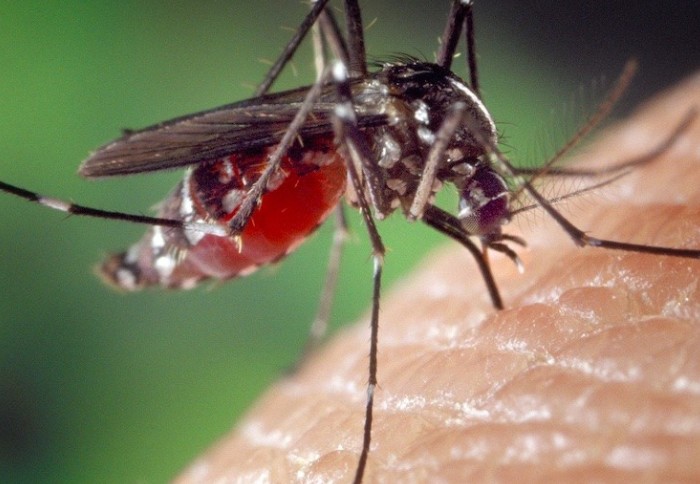Covid won’t be the last pandemic – climate change will make sure of that

mosquito
As the world warms, infectious diseases will spread – now’s the time to prepare, says Dr Ilaria Dorigatti.
Southern France isn’t where you might typically expect to catch dengue fever, a mosquito-borne disease from tropical regions, but this summer (2022) saw a cluster of more cases than ever before.
According to scientists, climate change and global travel are the culprits, with global warming allowing the disease to move further north into Europe.
While the outbreak in France was relatively small (65 locally acquired cases), it is a warning sign of things to come, says Dr Ilaria Dorigatti, Senior Lecturer & Sir Henry Dale Fellow, in the School of Public Health.
Here, the mathematical modeler explains how climate change is impacting the spread of infectious diseases, and how we can use the experience of Covid to better prepare.

What’s your research about?
I study how infectious diseases transmit in populations and what drives their transmission. Mathematical modelling can help inform how to develop and implement interventions for maximum impact.
I specialise in modelling dengue, Zika and other arboviruses, which are emerging mosquito-borne infections. Because the biology of mosquitos is highly dependent on climate, the dynamics of these diseases are highly affected by climate change.
One objective of my research is to better understand and identify how climate affects transmission pathways. Hopefully this will save lives.
How is climate change impacting the spread of infectious diseases?
There is evidence that climate change is affecting the range and geographical spread of these diseases. Dengue fever in southern France is one example – we know that climate change will make it possible for tropical diseases to expand into temperate regions, affecting a large number of people with no prior immunity, thereby making control very difficult and increasing the likelihood of explosive epidemics.
As climate change lengthens the warmer seasons, it could also lengthen the disease season in tropical and sub-tropical regions, and therefore infect more people. Climate change also affects the emergence of new disease. As animals and people are pushed into smaller areas, the contact they have increases, and so does the risk of a disease jumping from animals to humans.
High global connectivity through human travel is also clearly affecting the risk of disease transmission globally, while also contributing to climate change itself.

What can we expect as climate change progresses?
We expect more tropical diseases to emerge and existing viruses to circulate more in temperate regions. West Nile virus, for example, has already expanded its range and intensity across Europe over the last decade and we are worried it could invade the UK too.
For some vector-borne diseases we have effective vaccines and vector-control strategies, but we don’t have these for all diseases. Some methods are currently in development, and modelling can really help understand how to best use these tools. But there has to be the political will to make these tools and strategies available to the population.
Some studies suggest that if we reduce GHG emissions, we can mitigate the increasing burden of dengue disease. But other studies suggest that even if we manage to keep warming below 2C from pre-industrial levels, the risk of spill over of disease from animals to humans will still substantially increase.
How can we stop disease spreading?
We need to strengthen our disease surveillance systems in both human and wildlife populations, so that we can effectively identify and track disease and new variants. Covid-19 really taught us that.
For some diseases we can also vaccinate, and/ or use vector-control strategies such as insecticides. However, these are not particularly effective and are also very costly. One new, biologically friendly method though, is using mosquitoes infected with a bacterium called Wolbachia, which reduces the mosquitos’ ability to transmit the virus.
An alternative is releasing genetically modified mosquitos, to replace or reduce wild mosquitos. The females replace wild mosquito populations, while the males suppress the number of mosquitos, since they carry a self-limiting gene.

What can we learn from the Covid-19 pandemic?
I hope governments and public health agencies will have the energy and resources to invest in really learning lessons from the Covid-19 pandemic. One of the key priorities I see is strengthening surveillance in both animal and human populations.
There is also a need to better share information in real time, as well as coordinate the response globally. I hope for more integration of modelling and public health decision making as well as more equitable access to resources globally, so everyone can benefit from interventions.
How do you feel about the future?
I feel optimistic, in the sense that we have new interventions, which appear to be self-sustainable, very effective and cost effective. On the other hand, these interventions really need to be implemented, so I hope that the resources and political will are there to make that happen.
Article text (excluding photos or graphics) © Imperial College London.
Photos and graphics subject to third party copyright used with permission or © Imperial College London.
Reporter
Jez Fredenburgh
The Grantham Institute for Climate Change
